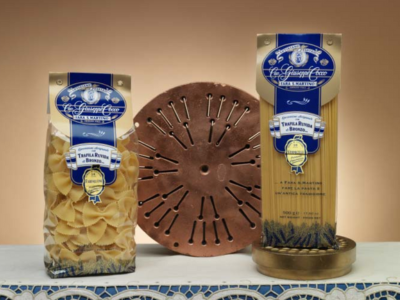When it comes to authentic Italian pasta, Giuseppe Cocco is a name that stands out. This renowned brand, with its deep-rooted traditions, is synonymous with high-quality, artisanal pasta. At Classic Fine Foods, we take immense pride in being the official distributor of Giuseppe Cocco pasta, offering the finest Italian culinary experiences to kitchens worldwide. This article delves into the art of Giuseppe Cocco pasta-making, the meticulous selection of ingredients, and why this pasta is revered by chefs and food enthusiasts alike.
The Quality of Raw Materials
One of the key factors in Giuseppe Cocco's success is the uncompromising quality of the raw materials. The wheat used is selected based on strict physical and chemical criteria, such as the presence of high-quality gluten and the absence of pesticides. The climatic conditions of the growing regions are also carefully considered to ensure that the wheat meets the brand’s rigorous standards. .
Giuseppe Cocco’s refusal to mix semolina from different grains allows them to highlight the unique characteristics of each type of wheat. For instance, the Arizona Extra Durum wheat is celebrated by experts for its high protein content, resilient gluten, and beautiful yellow color, making it one of the best durum wheats in the world. Giuseppe Cocco uses this wheat because they believe it is the best available, contributing to the superior quality of their pasta.

The Water of the Green River Spring
Water plays a crucial role in the production of Giuseppe Cocco pasta. The brand uses water from the Sorgente del Fiume Verde (Green River Spring), which is known for its purity and excellent organoleptic characteristics. This water, which has helped Fara San Martino become one of the world’s pasta capitals, is added cold to the dough to preserve the semolina's natural properties. .
In the early 1900s, water was also used to generate electricity for pasta production. Today, while its role has evolved, water remains a humble yet essential ingredient in Giuseppe Cocco pasta, contributing to the dough’s perfect consistency and the pasta's unique taste.
.png)
Mountain Air: The Role of Natural Drying
Air is another crucial element in the production of Giuseppe Cocco pasta, particularly during the delicate drying phase. In the past, pasta was dried naturally on reeds in the sun. Today, this process is replicated in static drying cabins, where the pasta is dried at natural temperatures using pure, uncontaminated air. This traditional method preserves the pasta’s flavor and texture, ensuring that it remains as close to the original as possible. .

Artisan Workmanship
The pasta produced by Giuseppe Cocco is a true example of artisan workmanship. The production process adheres to ancient traditions, using original machinery from the early 1900s that has been meticulously restored. The circular bronze dies used in the process are unique, giving the pasta a rough texture that is ideal for holding sauces. For long pasta, Giuseppe Cocco employs a double circular bronze die technique, which ensures uniformity and consistency across all strands of spaghetti. .
The final phase of pasta production is the drying process, which is conducted in static dryers reconstructed according to historical designs. The pasta is dried at a low temperature of 46-48 degrees, a method that takes more time and space but results in a product that retains the flavor and texture of traditional pasta.

Slow & Cold Dough

The Bronze Drawing Dies

Static Drying






